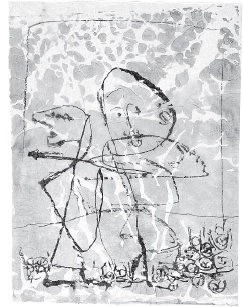Only the nearest trees still stood there. Where he had just been walking, something else had begun to spread, something grey. It covered up his steps as though they had never been taken. He realised as he walked here that something else walked through the forest too; a spell presided over things that made the old disappear, making new spaces and unknown sounds out of the familiar. More clearly than before the voice recited a rhyme from a wordless song: ‘dream and tree’. As he heard this, so loud and sudden, he came to his senses. His eyes focussed; yes, he wanted to see in focus: ‘reasonable’, warned the voice. He fixed his gaze on the path and, to the extent that it was possible, he distinguished. Over there a footprint, a root, moss, a tuft of grass, and at the edge of the path a large rock. But a new horror gripped him – as clearly as he saw, it was not as it usually was. And the more he mustered all of his strength to see, the more alien everything became. The rock over by the path grew larger – it appeared to speak. All relations were transformed. Everything particular became landscape, a spread-out image. Desperation seized him; to flee from all of this, to gain clarity in the horror. He took a deep breath and looked to the sky with resolve and composure. How strangely cold the air was, how bright and near the stars.
Did somebody scream? ‘The forest’, a voice rang loudly in his ears. He saw the forest … He ran in, jostling against the tree trunks – only further, deeper through the fog, where he had to be … where there was somebody who made everything different, who created the dreadful evening in the forest. A tree stump threw him to the ground.
There he lay and wept with fear, like a child who feels a strange man approaching in a dream.
After a while he grew silent – the moon came and the brightness dissolved the dark tree trunks into the grey mist. Then he recovered and went home.
—
Translated by Sebastian Truskolaski.
Fragment written c. 1911; unpublished in Benjamin’s lifetime. Gesammelte Schriften VII, 639–41; also translated in Early Writings (1910–1917), 46–8.

Public Duel (Öffentliches Duell), 1932.
Krambacher is a rather dwarfish clerk and moreover a man ‘with no attachments’, as he assures the landladies of the furnished rooms, which he changes every four to six weeks. For several weeks he has been wondering where he might spend New Year’s Eve. But all his arrangements have fallen through. With the last of his money he has bought two bottles of punch. From nine o’clock onwards he starts a lonesome binge in the constant hope that his doorbell might ring, that somebody might call on him to keep him company.
His hopes are dashed. Just before eleven he heads out. He got cabin fever. We follow his uncannily lilting stride through the nocturnal streets. It is obvious that he has been drinking.
1 comment